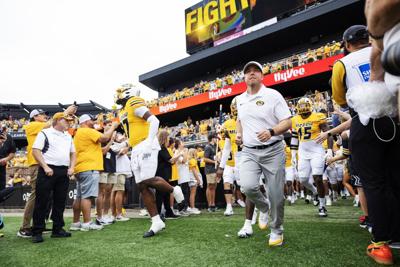COLUMBIA, Mo. — The last two minutes of the first half are changed-up crunch time for Missouri.
Through four games, it’s been in that window the No. 11 Tigers (4-0, 1-0 Southeastern Conference) have most acutely felt the impacts of two key rule changes new to college football in the 2024 season — and there have been lessons for Mizzou to learn.
Coach-to-helmet communication and the addition of a two-minute warning are the two small but notable modifications to the college game that began this season. Neither is particularly complicated: Up until there are 15 seconds on the play clock or the ball is snapped, whichever comes first, a single player on each side of the ball has a coach speaking to them through an earpiece. And when the clock crosses the two-minute threshold in both the second and fourth quarters, officials call a media timeout.
Those changes are designed to align the college game with NFL procedures. And both have popped up as an inconsequential but noteworthy adjustment in the first half of separate Mizzou games so far this year.
People are also reading…
The MU offense had the ball as the first half’s two-minute timeout approached against Vanderbilt last weekend, trailing 10-7. A wheel route pass to running back Marcus Carroll had pushed the Tigers into the red zone with a running clock.
Crucially, the game clock would have hit 2:00 with two seconds still on the play clock. “Now, Coach (Eli) Drinkwitz and Kirby Moore and Brady Cook don’t have to run a play if they don’t want before the two-minute timeout,” the SEC Network commentary crew noted, identifying Missouri’s coach, offensive coordinator and starting quarterback.

Missouri football coach Eli Drinkwitz arrives on the field before a game against Vanderbilt on Saturday, Sept. 21, 2024, in Columbia, Mo.
Nonetheless, on first-and-goal, Mizzou snapped the ball before the timeout. That stopped the clock ahead of its second-down play. That play was stuffed, leaving the clock running into third-and-goal. But it was already obvious that because the Tigers couldn’t move the chains, they would either score or turn over the ball with time on the clock for the Commodores to try for points before halftime. An incomplete pass on third down and field goal on fourth meant Mizzou kicked off to Vanderbilt with 1:17 left in the second quarter.
Drinkwitz actually used a timeout to keep the Commodores’ ensuing three-and-out to just 20 seconds of game time. But, as has been noted previously, the Tigers once again snapped the ball when they didn’t need to — this time just before the clock ran out into halftime — leading to a fourth-down sack on Mizzou’s own side of the field.
Those eight seconds allowed Vanderbilt to move the ball just inside field goal range and steal three points from some clock management chaos. Both teams received possessions they theoretically didn’t need to have, and it was the Commodores who turned their stolen time into points.
“It puts coaches in a really difficult decision, and players in a decision to execute,” Drinkwitz had said before the game. “And if they don’t, they leave time on the clock … There’s a lot of analytics that you have to study and you have to be, in real time, be able to make those decisions on what you want to do.”
In a general sense, he said the added stoppage, which might just mean time for a bathroom break or more commercials to watch on mute for fans, is a big deal on the sidelines.
“It’s very significant in how you can utilize timeouts and kind of manipulate the clock and coaches,” Drinkwitz said. “You can manipulate people into have to run certain plays or certain schemes.”
While that appearance of a new rule led to MU’s opponent receiving an opportunity, the season opener saw the Tigers miss out on one because of something new.
In Week 1 against Murray State, Mizzou settled into a first-and-goal with 17 seconds left in the second quarter and just three yards between the offense and the goal line. With one timeout and short yardage, it looked like Missouri could get three chances to try for a touchdown before kicking a field goal to salvage points.
Because of a penalty on the previous play, the clock started ticking down from 17 seconds after officials spotted the ball and gave the Tigers the go-ahead to snap it at their leisure.
“Gotta go, gotta go,” Moore yelled through his headset into Cook’s helmet, urging the quarterback to snap the ball to save time. But Cook misinterpreted the message and walked toward MU’s offensive line to change directions to his team.
By the time he’d thrown an incomplete pass on first down, there were only five seconds left in the half. Cook looked back at the sideline and gestured toward the speaker on the sideline of his helmet.
Mizzou wound up running a play instead of a field goal try in those five seconds, scoring a touchdown.
But the call was a close one.
“We screwed up the end of half right there with Brady when the clock was running,” Drinkwitz said. “In the communication, we were telling him ‘gotta go, gotta go,’ and he thought we were making a check. So that’s what the communication was there. We’re gonna have to figure that out because in a critical situation, that clock blunder right there is massive.”



















